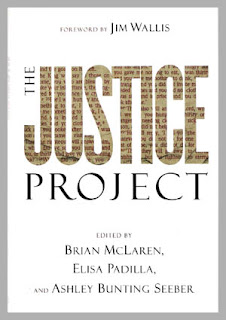 The Emerging Church movement, a self-described ‘conversation’ among people from many walks of life, has captured my recent interest. Questioning many basic truths and emphases of the Christian story, ‘Emergents’ have become controversial within Protestant Christianity. In theory, they are a diverse group of dreamers, offering fresh perspectives on the Gospel. In practice, they are primarily young, American hipsters fed up with traditional Evangelicalism. They recoil against their parent’s faith, the sterile, staunchly-conservative Evangelicalism of the past century.
The Emerging Church movement, a self-described ‘conversation’ among people from many walks of life, has captured my recent interest. Questioning many basic truths and emphases of the Christian story, ‘Emergents’ have become controversial within Protestant Christianity. In theory, they are a diverse group of dreamers, offering fresh perspectives on the Gospel. In practice, they are primarily young, American hipsters fed up with traditional Evangelicalism. They recoil against their parent’s faith, the sterile, staunchly-conservative Evangelicalism of the past century.
Though the movement has questioned or de-emphasized much of traditional orthodoxy—the miracles of Jesus, the realities of Heaven and Hell, and the grave evil of abortion among other things—Emergents have re-ignited interest in other areas. The traditional Evangelical emphasis on heaven and salvation bred a de-emphasis of those things for Emergent. Instead, they focuse on the here-and-now. This backlash against an over-spiritualized Christianity spawned their emphasis on “social-justice”.
Though this focus doesn’t originate with the Emergents, their movement has contributed greatly to its growing intensity. Riding this wave of social-justice, Brian McLaren, a leader within the movement, gathered dozens of Emergent voices to produce a social-justice manifesto. “The Justice Project” (Baker Press, 288 pages, hardcover) is the result, a book of essays from more than 30 of the most penetrating thinkers in the justice conversation.
The book is loaded with social theory, but many of the essays also feature practical justice tips. A diverse crowd of contributors provides texture to the conversation, allowing different experiences and gifts to illuminate each topic.
While the diversity of contributors is welcome, the choice of topics will seem scandalous to many. In addition to essays on poverty, the environment, and universal education, an essay on “justice for families”—in which the author promotes acceptance of gay-marriage—sticks out like a sore thumb. As in “Zealous Love”, other major justice issues–like abortion and unethical biotechnology–are conspicuously absent.
Also, some authors skirt around theological relativism, hinting that it doesn’t really matter what you believe as long as you help people. This confusion of the Gospel with social-justice is a major shift from traditional Christianity, which has always taught that both right-belief (“orthodoxy”) and right-action (“orthopraxy”) are vital and complementary.
Though it is a book about Christian justice, “The Justice Project” squeezes out most facets of the Gospel unrelated to justice. The message of Jesus and the Story of God are about more than the healing of physical, Earthly maladies. The Gospel includes social-justice, but it reaches much deeper. When holistic faith is replaced by passionate activism, much of God’s story is lost; the plot becomes watered-down. We become Christian social-workers instead of authentic disciples. “The Justice Project” promotes the former orientation over the latter.
Overall, “The Justice Project” provides smart conversation on issues of social-justice and presents an accurate portrait of the Emerging Church movement. Those curious of justice’s place in Christianity will find interesting proposals. But while good intentions fill the book’s pages, its faults and warped emphases preclude recommendation.
